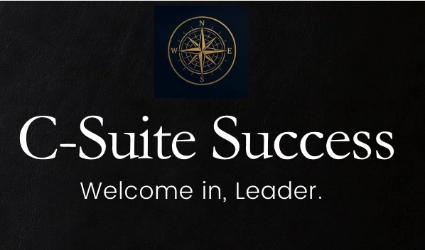A Calm Eye in the Center of the Storm: How C-Suite Leaders Can Foster Trust and Connection in a Fast-Paced World

-
How C-Suite Leaders Can Foster Trust and Connection in a Fast-Paced World
- The Importance of Trust and Empathy
- Empowerment through Connection
- Be Present & Actively Listen:
- Focus on Their Development:
- Encourage Open Communication:
- Hold Yourself Accountable:
Disclosure: Some of the links in this article may be affiliate links, which can provide compensation to me at no cost to you if you decide to purchase. This site is not intended to provide financial advice and is for entertainment only.
A Calm Eye in the Center of the Storm:
How C-Suite Leaders Can Foster Trust and Connection in a Fast-Paced World
Guest Column, by C-Suite Success Partner:
Michael Termini, Chief of Staff, The American Society of International Law
Our world couldn’t be more frenetic. If we are to stay attuned to the needs of our team, an opposite and equal approach is needed to cut through today’s blistering pace. We need to slow down and connect with our team despite the storm – indeed, we often need to do so right in the middle of it.
Many of the individuals I have had the privilege to coach, ranging from young professionals to senior leaders, frequently seek my advice on staying attuned to the needs of the people they serve in their work. As I highlighted in a recent LinkedIn post, I consistently emphasize that this begins with a genuine effort to establish and build trust with their team members, and prioritizing that effort despite the storm. Such trust can be built with regularly scheduled check-ins that can take the shape of an hourly weekly or bi-weekly meeting, or even eventually just a quick, five minute catch-up once centered and that trust is established. Do you think you don’t have the time? That tells me something. The length of time isn’t the focus. What matters is that you prioritize connection. You may think you already do this, but do you? Do you often cancel or reschedule these meetings when another “priority” arises? Do you often show up late, leave early, or bulldoze through agenda items with your team and get out of there as quickly as you barged in? That tells me something too. What matters is authentic prioritization and a consistent commitment to being centered together – a still space they can count on and trust as a calm center in the eye of the storm.
The Importance of Trust and Empathy
Many espouse that establishing trust is the cornerstone of any successful leadership strategy. But are they taking the steps necessary to engender that trust with their teams? Genuine trust is built through empathy and understanding. Crucially, this trust can only really take root and be sustainable if you can truly empathize with, and thus accurately perceive, the real challenges they face on the ground. With the permission granted to gain entry into their perspective, based on mutual trust, you position yourself to coach them effectively in taking steps toward meaningful and actionable solutions. These solutions will help them drive organizational change in a way that is both safe for them and sustainable.
This approach aligns with the principles of servant leadership, in which our primary goal is to serve others; that is, to lead is to serve.
This is about creating an environment in which team members both feel and in actuality are understood and supported. We respect them enough to actually see them, and in so doing allow and empower them to be the experts we have hired them to be. That cultivates trust, and if we continue to follow through, that trust is cumulative. As their guides, it is our shared responsibility to provide our team with the respect, trust, and best practices that validate their trust in us. Doing so helps our teams achieve measurable improvements in their performance and work-life experience, as well as the overall health and success of the organization. This in turn helps facilitate the win-win-win scenario (or “service-profit-chain” in MBA speak) exemplified by world-class negotiator, and, frankly, incredible human being, William Ury, who I had the honor to experience through an unforgettable continuing education seminar at The Chief of Staff Association. The point here is that a coach must consistently endeavor to engender an authentic atmosphere of mutual respect and trust, while being prepared to provide the best practices and tools to support their teammates in taking their new next steps with courage, confidence, and excellence.
Empowerment through Connection
But again, this cannot take root without the fertile ground prepared through the cultivation of trust -- and that is where the prioritization of connection via check-ins comes in.
Here are some guiding principles:
Be Present & Actively Listen:
Be here, now. Stop resisting the meeting, which is the same as resisting the moment and resisting them. Active listening is a critical skill that helps us build trust and demonstrate empathy. Stop listening just to reply. Start listening to authentically understand.
Focus on Their Development:
Use these sessions to discuss career aspirations and personal development. Help team members identify opportunities for growth and provide the necessary resources and support. Doing so not only helps us chart a course that is strategically leveraged and aligned with them and the organization, it provides a safe space to share feedback on areas where they will need to grow or achieve further alignment with the executive vision in order to make that path a reality. In other words, the win-win-win.
Encourage Open Communication:
Create that safe, still space where team members feel comfortable sharing their thoughts and concerns with you in the center of the storm. You hired them because they are experts that see things you do not. You need them. Empower them and trust them to be who they are here to be. This openness can and very often does lead to innovative solutions you couldn’t previously see, as well as highly collaborative, agile teams and improved team dynamics. Earn their confidence and then be deserving of keeping that confidence by being a person of integrity.
Hold Yourself Accountable:
Hold yourself accountable to a higher standard, and then intentionally model that behavior. Follow through consistently on your commitments with them on how best to serve them in meeting their challenges. Flowing directly from the previous principle, as John Maxwell speaks of in "The 360 Degree Leader" and "The 21 Irrefutable Laws of Leadership," leaders must model the behavior they wish to see in their teams. There’s just no faking this. You have to grow too, and often, you have to grow first. Consistently follow through and demonstrate integrity, empathy, and your own commitment to personal and professional growth. Be the leader you wish to had, and be in the business of creating leaders by starting with your own example.
You will note what is missing from this list. These meetings are not just for giving assignments or for ascertaining progress on deliverables. That is necessary at times of course, but that alone is not coaching, which is the most effective way to drive individuals to the heights of productivity and fulfillment. In these meetings, I fully commit to using their work as a mere vehicle through which to have a larger philosophical, yet practical strategic discussion to help them identify and actualize their personal and professional goals. This helps them see the alignment that exists between their individual goals and those of the organization and fosters that synergy for continued growth, advancement, and improvement.
This time is for them. By being fully present with and for them, and providing the guidance that I am in the position to offer, I can help them chart a more Maslow-oriented course in their profession that will help lead them to a more self-actualized state. This cannot be overstated: this benefits all parties; an actualized and appreciated team member that succeeds forms a causal link with the success of the organization -- a necessary link in the service-profit-chain -- and it is our shared duty to help them forge that link. Maximizing their ability to succeed in their own professional goals as respected, admired, and enfranchised team members helps make that a real possibility.
Ultimately, our focus must shift from merely supervising our team members, to serving them, to leading them -- which is saying the same thing. We authentically help them address their workplace needs while coaching them to progressively grow and improve, as people first, who are deserving of our attention and respect as they inevitably advance in the organization. This servant leadership is deeply valued and inspires staff to model this behavior, which in turn helps create more leaders. This results in increased performance that benefits the organization and thus the people and mission we are here to serve. But even more importantly, it improves their lives and creates teams of leaders in the process.
In the end, that is what the world needs and the type of leader that I choose to be.
>>
Michael Termini serves as the Chief of Staff at The American Society of International Law on Embassy Row in Washington, DC. All views expressed here are his own.
Michael is an active member of the DC Chapter of The Chief of Staff Association -- the peak international body for Chiefs of Staff in leading corporations, non-profits, governments, the military, and diplomatic corps across over 50 countries.
Michael has served as a consultant and strategic adviser to a host of non-profit organizations. He has a certification in Executive Leadership from Cornell University through the Cornell SC Johnson College of Business; a Lean Six Sigma Black Belt (LSSBB) certification from the Six Sigma Global Institute, an Authorized Training Partner of the Project Management Institute (PMI®); a certification in Strategic Organizational Leadership from the Management and Strategy Institute (MSI); and, a certification in Conflict Management, also from MSI.
Michael graduated with distinction from Kent Law School at the University of Kent in Canterbury, England, with a dual LL.M. Master of Laws degree in International Law and International Relations, and Magna Cum Laude from the State University of New York at New Paltz with a Bachelor’s degree in Philosophy and Psychology. Michael is also the author of Exceptionalism and the George W. Bush Presidency: A New Extreme Taken at the Expense of the International Rule of Law (VDM Verlag Publishing, 2009).
-
How C-Suite Leaders Can Foster Trust and Connection in a Fast-Paced World
- The Importance of Trust and Empathy
- Empowerment through Connection
- Be Present & Actively Listen:
- Focus on Their Development:
- Encourage Open Communication:
- Hold Yourself Accountable:
Disclosure: Some of the links in this article may be affiliate links, which can provide compensation to me at no cost to you if you decide to purchase. This site is not intended to provide financial advice and is for entertainment only.
